We have a couple of announcements as well as various Islamic and hadith books that we have in stock which we want to share with you.
Author Evening with Shaykh Omar Subedar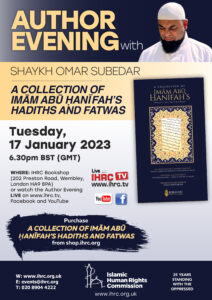
Join us today for an author evening with Shaykh Omar Subedar who will be discussing his latest publication A Collection of Imam Abu Hanifah’s Hadiths and Fatwas.
WHEN: Today, 17 January: Author Evening, IHRC Bookshop, 6.30pm GMT – join us at the IHRC Bookshop (202 Preston Road, Wembley, HA9 8PA) or watch online on YouTube, Facebook and IHRC.TV
This book has been prepared to clarify the many misconceptions about Imam Abu Hanifa. It takes the reader on a journey to observe the unfiltered of Abu Hanifah in his fiqh and his true attachment with hadith literature. This book contains over 500 narrations, which the Imam has reported himself. Many of these narrations have been supplemented with relevant rulings that have been drawn from the books of Muhammad ibn Hasan al-Shaybani such as Asl, Jamir al-Saghir, Kitab al-Athar and Kitab al-Hujjat ala Ahl al-Madinah.
Whether one follows the Hanafi madhab, another madhab or no madhab at all, this book will provide immense value in understanding classical Islamic law.
Hadith Infographics – Mahdi Tabatabaie Yazdi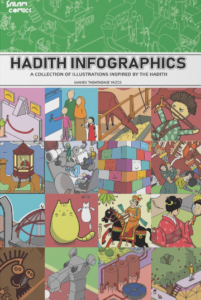
A fun and colourful new book in the Infographics series from Salaam Comics.
Containing thought provoking illustrations and authentic narrations from the Prophet Muhammad (PBUH), readers of all ages will be engrossed by every page.
Consistent with the first Infographics title, this book features illustrations in different art styles from around the world – Japanese, Chinese, Indian, Persian as well prehistoric and medieval historical eras too.
Fiqh al-Zakah – Yusuf Al-Qaradawi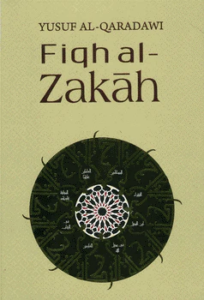
Zakah is third only to the declaration of faith in God and His Prophet, and the five daily prayers. Yet it has not attracted the attention of modern Muslim scholars to commensurate its importance and analyze its laws taking into account the contemporary issues and problems. This book by one of the most authoritative contemporary Muslim scholars is an extensive study of the Zakah, its regulations and philosophy in the light of the Qur’an and Sunnah, to show it is both a pillar of religion as well as a practical application in modern socio-economics.
The history of the text of the Qur’an has been a longstanding subject of interest within the field of Islamic Studies, but the debate has so far been focused on the Sunni traditions about the codices of Caliphs Abu Bakr and ‘Uthman b. ‘Affan. Little to no attention has been given to the traditions on ‘Ali b. Abi Talib’s collection of the Qur’an.
This book examines both Shi’i and Sunni traditions on the issue, aiming to date them back to the earliest possible date and, if possible, verify their authenticity. To achieve this, the traditions are examined using Harald Motzki’s isnad-cum-matn method, which is recognised as an efficient tool in dating the early Islamic traditions and involves analysis of both matn (text) and isnad (chain of transmission) with an emphasis on finding a correlation between the two.
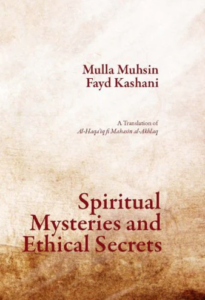 Spiritual Mysteries and Ethical Secrets – Mulla Muhsin Fayd Kashani
Spiritual Mysteries and Ethical Secrets – Mulla Muhsin Fayd Kashani
A Translation of Al-Haqa’iq fi Mahasin al-Akhlaq.
Since its completion in the seventeenth century, this book has been lauded as a valuable textbook on Islamic spirituality and ethics as well as a spiritually enlightening read. This ground-breaking translation brings to light how Fayd Kashani engages with the Sunni Sufi tradition – particularly the ideas of al-Ghazzali – for the benefit of a Shi‘a audience.
In addition to presenting the inner mysteries of Islamic ritual practices, Fayd also explains the nature of the human character and how to cultivate, balance, and eliminate various traits. Fayd Kashani centres his discussion on verses of the Qur’an and narrations (hadiths) from the Prophet Muhammad (S) and the twelve Imams (A). Serving as a useful reference work, this book includes the original Arabic narrations for the reader’s convenience.
Fayd Kashani (1598-1680) was a renowned Iranian Islamic scholar who specialised in hadith, jurisprudence, philosophy, and mysticism. He left behind over two hundred works, including al-Wafi, one of the most influential modern collections of hadith.
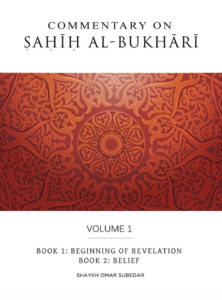 Commentary on Sahih Al-Bukhari Vol 1 – Shaykh Omar Subedar
Commentary on Sahih Al-Bukhari Vol 1 – Shaykh Omar Subedar
In the first section of the book, Imām al-Bukhārī discusses the essence of divine revelation, its types and the way it was conveyed to our beloved Messenger (peace be upon him). He presents narrations that demonstrate the way the Prophet (peace be upon him) conducted himself when receiving revelation, both for the first time and later on in his life, and how he would share the divine message with others.
In the second section of the book Imām al-Bukhārī explores the definition of Īmān and Islām, and then looks into their various levels. He opens the doors to a detailed discussion on the different components of Īmān and then enters into the classical theological debate of whether Īmān increases and decreases or not.
Shaykh Omar Subedar has also published Volume 2 of the book which is also available at IHRC Bookshop.
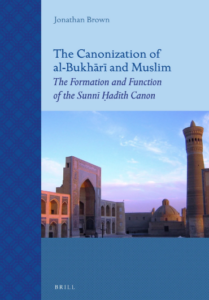 The Canonization of al-Bukhari and Muslim – Jonathan Brown
The Canonization of al-Bukhari and Muslim – Jonathan Brown
Drawing on canon studies, this book investigates the origins, development and functions of the core of the Sunni hadith canon, the ‘Authentic’ hadith collections of al-Bukhari and Muslim, from the time of their authors to the modern period.
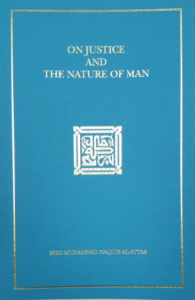 On Justice and the Nature of Man – Syed Muhammad Naquib al-Attas
On Justice and the Nature of Man – Syed Muhammad Naquib al-Attas
In this monograph, the author selected and makes a commentary on verses in the Holy Qur’an, surah al-Nisa’, verse 58 and surah al-Mu’minun verses 12-14. He argues that these verses convey the nature of justice and of man that may have not been elicited from them before in such way as to reveal the essential meanings intended by them.
The author starts with deliberating on the five fundamental key terms contains in surah al-Nisa’: 58; amr (Divine command), amanah (trust), ahl (the Keepers), hakam (the arbitrator or judge), ‘adl (justice) which the author believes these key terms intended meaning is to warn us against our habitual tendency to stray from the right course in the exercise of power.
The author maintains that man is not a genus nor species but a new and a special creation, contrary to the evolutionist and positivistic theory which views man as a species that gradually undergone evolutionary process of natural selection from a common ancestor for hundred thousand of years.
The author then proves this claim by establishing the period of history of mankind i.e the arrival of Prophet Adam a.s to this world. In order to establish this historical timeline of mankind, he uses three sources in his rational estimation methodology; verses in the Holy Qur’an, prophetic tradition (hadith), and history and archaeological discovery particularly on period of Kings and Rulers. He asserts that the arrival of Prophet Adam and his wife was about 7000 or 8000 years ago and not tens and hundreds of thousands years for man to evolve to the stage of homo sapiens.

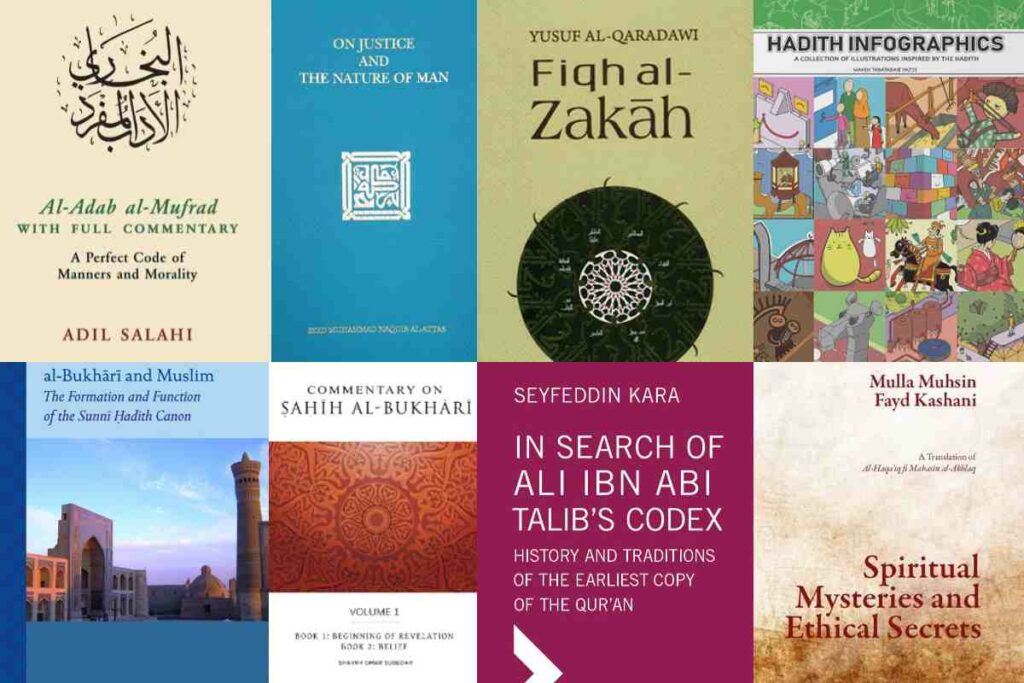
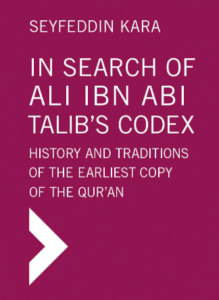 In Search of Ali Ibn Abi Talib’s Codex: History and Traditions of the Earliest Copy of the Qur’an – Seyfeddin Kara
In Search of Ali Ibn Abi Talib’s Codex: History and Traditions of the Earliest Copy of the Qur’an – Seyfeddin Kara




